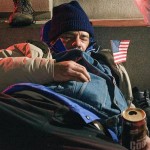The property of George Washington's step great granddaughter was turned into a cemetery for the Union dead in June 1864 to both bury their dead and in order to prevent General Lee's family from ever returning home. It became a national cemetery in 1883. Arlington National Cemetery is also the final resting place of 5,000 unknown soldiers from this nation's many wars.
About three million people visit Arlington National Cemetery each year to see the simple white marble headstones lined up in perfect row upon row. Beneath each unassuming headstone lays men and women from every war and conflict. At Arlington rank, title, or social status means nothing. Neither does their race, religion or politics. Nothing speaks "equality" like death. But once many were famous; people like Audie Murphy, Lee Marvin, Thurgood Marshall, Robert "Bobby" Kennedy, President John F Kennedy and Jackie Kennedy Onassis, Medgar Evers, Lt. Colonel Virgil "Guss" Grissom, Admiral William "Bull" Halsey, and Ira Hayes.
Did you know that Memorial Day was first commemorated 1861 in Warrington, Virginia to honor the Confederate dead? In 1862, the women in Savannah, Georgia followed suit in honor of their Confederate dead. In 1863, this was extended to include all those who had died at Gettysburg.
Later, after the Civil War had come to an end, the United Daughters of the Confederacy, which had evolved from the Ladies Memorial Association, established chapters throughout the South in which to honor and remember their war dead. This was known as "Remembrance Day", though a few states called decided to call it "Memorial Day".
In 1868, the practice which had started at Gettysburg, was increasingly adopted throughout all the Northern states. In July 1913, surviving members of the North and South gathered again in Gettysburg. This wasn't the time to fight, but to remember and honor those who had died in what was the bloodiest war in American History; a war which claimed over 500,000 lives. By contrast, World War II costs 405,399 US lives while Vietnam claimed 90,220. Compare that to Afghanistan, our longest military conflict at 20 years, which has seen a loss of 2,305 service personnel.
Thus, what had started off as a day to remember the Confederate war dead, had
become the public act of remembering all of our nation's war dead. Although
generally known as "Declaration Day" for all the flowers, ribbons, and
banners starting around 1882, people gradually returned to the name, "Memorial
Day", which had become the most common by the end of World War II. So, in
1967, the "Day of Remembrance" and "Declaration Day" were
officially changed to "Memorial Day".
In addition to remembering all those who sacrificed their lives for this
country, let's also not forget that we lose, on average, 20 veterans a day to
suicide, often as a result of post-traumatic stress disorder (PTSD), service
connected injuries (especially among post active duty disabled veterans).
That's about one suicide every hour of every day. Most are between 55 and 74
years of age. The states with the highest rates of suicide are Texas and
Florida.
We also need to remember that on any given night there are an estimated 40,000 homeless veterans living on the street. Homeless veterans make up just under 10% of all homelessness. 57% are white while 26% were black. 85% are listed as non-Hispanic. The rest are multiracial. Approximately 89.5% are men. The states with highest number of homeless veterans are California, Florida, Texas, and New York, but every state and nearly every community has homeless veterans or those with temporary shelter.
My generation, the Babyboomers, has witnessed the passing of the last veterans from the Spanish-American War, World War I, and with an average of 245 World War II veterans dying each day, we'll likely to see them last of them pass by 2043 according to VA statistics. Veterans of the Korean War aren't far behind.
John McCrea volunteered to serve as a gunner and medical officer for an
artillery unit. Following the battle, which left many of the local towns and
villages in smoldering ruins, McCrea was stunned one early morning by how
quickly the crimson red poppies had bloomed on freshly covered graves and the
eerie silence. I suspect there's a good deal of truth in it since he had just
personally bury a close friend, Alexis Helmer, who had been killed on May 2nd.
The poem, written then following day, was originally published in 1919. So,
without further ado, here is "In Flanders Fields",
In Flanders fields the poppies blow
Between the crosses, row on row,
That mark our place; and in the sky
The larks, still bravely singing, fly
Scarce heard amid the guns below.
We are the Dead. Short days ago
We lived, felt dawn, saw sunset glow,
Loved and were loved, and now we lie
In Flanders fields.
Take up our quarrel with the foe:
To you from failing hands we throw
The torch; be yours to hold it high.
If ye break faith with us who die
We shall not sleep, though poppies grow
In Flanders fields.
U.S. Department of Veteran Affairs Report: Veteran SuicideRates By State
United States Military Veteran Suicide
When Will the U.S. Lose Its Last WWII Veterans?
How many Americans have died in U.S. wars?
From Enlisted to Incarcerated: Why Some Veterans End UpBehind Bars




2 comments:
Your best article yet. Very good.
Thank you.
Post a Comment